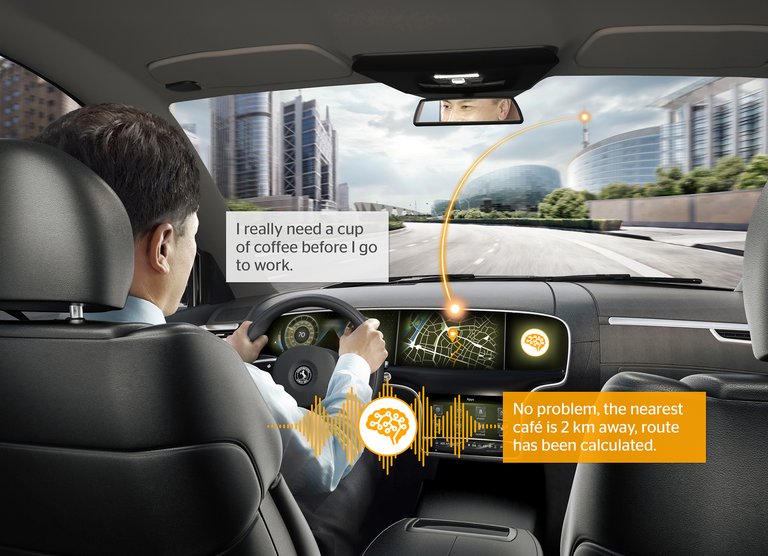Smart Voice Assistant: Continental Develops Adaptive Voice-Activated Digital Companion for Use in Cars
- Smart and adaptive driver assistance system enables natural dialog, understands multiple questions in one sentence and detects logical connections
- Distraction-free operation via smart voice control enhances road safety
- Hybrid solution with cloud connection, enabling driver and vehicle to understand each other – even in dead spots
Wetzlar, July 18, 2019. Where not long ago it was mainly the sound of the radio, passengers or children on the back seat that could be heard, the car itself is now becoming a smart communication partner. Driver assistance and infotainment systems are supplying more and more information. As a result, solutions are required that ensure intuitive, easy and, above all, safe interaction between the driver and car. To meet this demand, technology company Continental has developed an adaptive voice-activated digital assistant for vehicles.
With the digital assistant Continental focuses on the most natural means of communication: the spoken word. The system is capable of communicating almost like a human. Natural dialog design, the capability to understand multiple questions in one sentence and, above all, its capacity to detect logical connections make this innovative solution from Continental a smart companion on the road. Thanks to smart algorithms and a system architecture precisely tailored to the vehicle, the assistant continues to learn with every conversation, really helping out on the road. Frustrating answers like “I cannot understand you” or “That is beyond my capabilities” to legitimate questions are now a thing of the past.
“Vehicles are transformed into smart, ever-helpful companions”
Voice recognition is a complex yet crucial discipline for future generations of cars. With large touchscreens featuring intelligently displayed information increasingly replacing switches and buttons, the modern vehicle cockpit is a very different space to what it was even just a few years ago. Information is communicated in different ways so that the driver can understand it as intuitively as possible. But this is just one direction of communication: from vehicle to person.
“Smart voice control is the key to natural and safe communication with the vehicle, particularly in view of the future generations of semi-automated to autonomous cars,” says Johann Hiebl, head of the Body & Security and Infotainment & Connectivity business units at Continental. “Like the smartphone, the vehicle is also increasingly becoming a personal, ever-helpful and smart companion – mainly thanks to smart voice recognition, as offered by our new digital assistant.” What’s more, the system opens up further possibilities for manufacturers to set themselves apart from the competition – from design and engine performance through to battery range. These new, in-vehicle experiences will be crucial competitive differentiators in the future.
Smart means making connections
The smart voice assistant from Continental offers a number of key benefits, such as the seamless transition between various function menus. For example, the driver might ask for a route to activate the satellite navigation system. The driver might then ask about free parking spaces at the destination or even dictate an e-mail to book a table at a restaurant in the vicinity of the destination. The system ensures coherent communication, sends the relevant data from the navigation system to the parking space assistant, matches the internet search for restaurants to the location of the recommended parking garage and, finally, transfers data from the navigation system (estimated time of arrival) and restaurant search (address and e-mail contact) to the e-mail and voice recorder program in order to reserve a table. The assistant understands the request “search for restaurants there” and correctly interprets “there” as the previously selected destination. This may sound almost banal, but these kind of “human” communication skills make voice-activated operation much easier.
Another benefit is the system’s ability to detect meaningful connections without the driver having to issue standard – and rather irritating – commands every now and then. As soon as the driver says “I’m hungry,” the system can initiate a restaurant search. The assistant can also handle multiple questions or two tasks communicated in a single sentence. If the driver says “I would like to get to Continental in Hanover as quickly as possible and eat Chinese food somewhere nearby,” for example, the assistant will calculate the route and also search for Chinese restaurants near the destination.
The digital assistant is also capable of learning. With each interaction, the system optimizes the driver’s user profile. If, during the next trip, the driver says “I’m hungry,” the smart voice assistant will initially suggest Chinese restaurants to the driver if these have been frequently selected by the user. But with the response “No, I’d prefer Italian,” this selection can quickly be updated. This is especially useful because if the assistant is familiar with the user’s preferences, it will in the future – for example, if it notices that the electric vehicle battery does not have sufficient charge left – recommend a charging station near a shopping center, park or restaurant, depending on the user’s preferences.
Hybrid solution with cloud connection and apps in the vehicle
The technology continuously ensures the security of the data, which is “owned” by the car manufacturer or Continental. “The data is used only to optimize the driver’s personal profile and make communication even more seamless and intuitive. That is a crucial difference between this and other voice-activated digital assistants,” says Achim Seibert, head of the HMI & Speech department in the Infotainment & Connectivity business unit at Continental. The smart voice assistant from Continental is a hybrid solution comprising a cloud-based, voice-activated digital companion and natural voice recognition in the car. This means that important, safety-relevant drive functions can operate independently of any network connection. In an autonomous vehicle, for example, the command “Stop the car!” is executed even in a dead spot.
Another benefit is that the new voice-activated assistant can be coordinated with similar systems from other providers, allowing the driver to call up content, apps and files from back in the office or apartment while in the car. It may also be possible in the future for drivers to take the assistant and their personal profiles with them on their phones using, for example, the mobility app of an OEM or car sharing provider. And if you ever find yourself standing in front of a recommended restaurant but you decide to change your mind after all, a simple command to your smartphone would suffice: “Assistant, find me an alternative to the last restaurant.”

Alena Liebram
Media Spokesperson Automotive Aftermarket, Continental Engineering Services and Technology Organization
Continental Automotive

